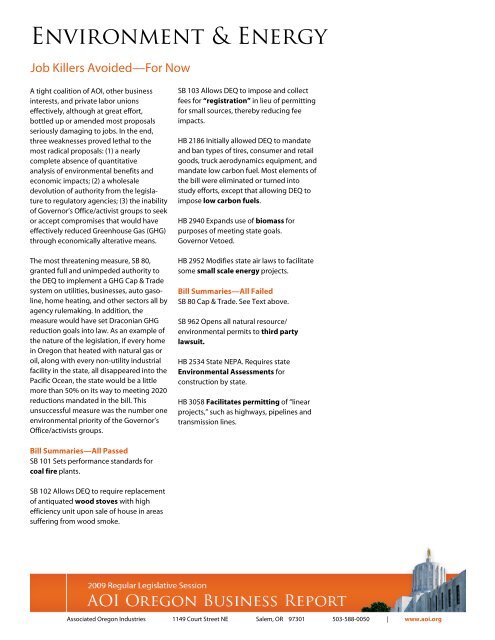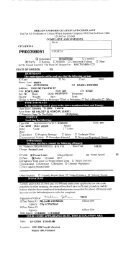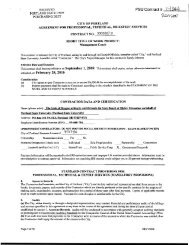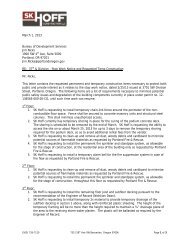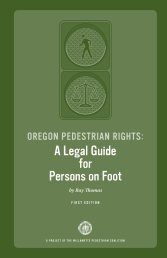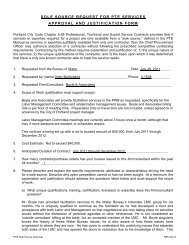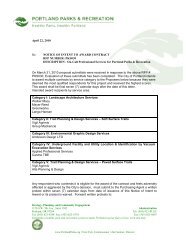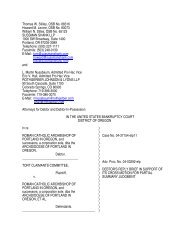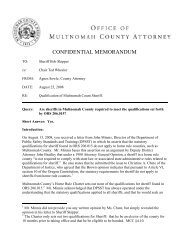AOI OREGON BUSINESS REPORT
AOI OREGON BUSINESS REPORT
AOI OREGON BUSINESS REPORT
Create successful ePaper yourself
Turn your PDF publications into a flip-book with our unique Google optimized e-Paper software.
Environment & Energy<br />
Job Killers Avoided—For Now<br />
A tight coalition of <strong>AOI</strong>, other business<br />
interests, and private labor unions<br />
effectively, although at great effort,<br />
bottled up or amended most proposals<br />
seriously damaging to jobs. In the end,<br />
three weaknesses proved lethal to the<br />
most radical proposals: (1) a nearly<br />
complete absence of quantitative<br />
analysis of environmental benefits and<br />
economic impacts; (2) a wholesale<br />
devolution of authority from the legislature<br />
to regulatory agencies; (3) the inability<br />
of Governor’s Office/activist groups to seek<br />
or accept compromises that would have<br />
effectively reduced Greenhouse Gas (GHG)<br />
through economically alterative means.<br />
The most threatening measure, SB 80,<br />
granted full and unimpeded authority to<br />
the DEQ to implement a GHG Cap & Trade<br />
system on utilities, businesses, auto gasoline,<br />
home heating, and other sectors all by<br />
agency rulemaking. In addition, the<br />
measure would have set Draconian GHG<br />
reduction goals into law. As an example of<br />
the nature of the legislation, if every home<br />
in Oregon that heated with natural gas or<br />
oil, along with every non-utility industrial<br />
facility in the state, all disappeared into the<br />
Pacific Ocean, the state would be a little<br />
more than 50% on its way to meeting 2020<br />
reductions mandated in the bill. This<br />
unsuccessful measure was the number one<br />
environmental priority of the Governor’s<br />
Office/activists groups.<br />
SB 103 Allows DEQ to impose and collect<br />
fees for “registration” in lieu of permitting<br />
for small sources, thereby reducing fee<br />
impacts.<br />
HB 2186 Initially allowed DEQ to mandate<br />
and ban types of tires, consumer and retail<br />
goods, truck aerodynamics equipment, and<br />
mandate low carbon fuel. Most elements of<br />
the bill were eliminated or turned into<br />
study efforts, except that allowing DEQ to<br />
impose low carbon fuels.<br />
HB 2940 Expands use of biomass for<br />
purposes of meeting state goals.<br />
Governor Vetoed.<br />
HB 2952 Modifies state air laws to facilitate<br />
some small scale energy projects.<br />
Bill Summaries—All Failed<br />
SB 80 Cap & Trade. See Text above.<br />
SB 962 Opens all natural resource/<br />
environmental permits to third party<br />
lawsuit.<br />
HB 2534 State NEPA. Requires state<br />
Environmental Assessments for<br />
construction by state.<br />
HB 3058 Facilitates permitting of “linear<br />
projects,” such as highways, pipelines and<br />
transmission lines.<br />
Bill Summaries—All Passed<br />
SB 101 Sets performance standards for<br />
coal fire plants.<br />
SB 102 Allows DEQ to require replacement<br />
of antiquated wood stoves with high<br />
efficiency unit upon sale of house in areas<br />
suffering from wood smoke.<br />
17<br />
Associated Oregon Industries 1149 Court Street NE Salem, OR 97301 503-588-0050 | www.aoi.org


